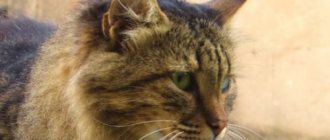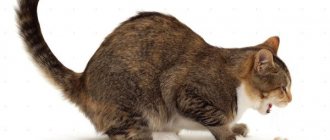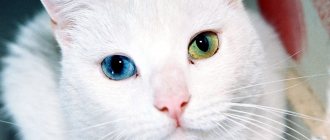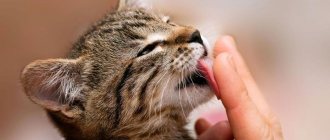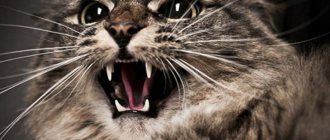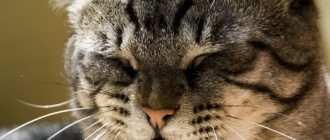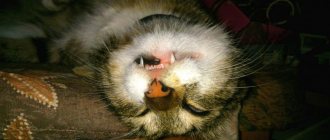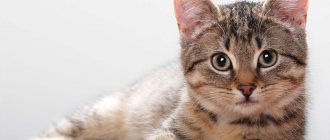What should I do if my cat doesn't bury her feces?
Cats instinctively bury waste from their life, although there is an opinion that this instinct is weaker in house cats. Initially, these actions were probably aimed at hiding traces of their presence from larger predators by masking the smell. In addition, this practice helped stop the spread of diseases and parasites in the habitat. But these skills are different for all cats. More confident individuals often leave traces of their presence, while nervous ones try to bury them better.
When a cat digs a hole in litter, it is copying the behavior of its mother that it saw as a child. If kittens have not seen anything like this, they most likely will not do this as adults. Especially if they had limited access to the litter tray and were unable to practice.
If your pet doesn't like the litter you bought, he won't bury the poop. Watch him when he uses the litter box. The cat may try not to step on the litter, shake off its paws, and circle around the tray for a long time before choosing a place. Sometimes he doesn’t even go into the tray, but only hangs his back over it. Check to see if there is enough litter in the tray so that your pet can dig a hole and bury his excrement. You may think that using more litter is a waste of money, but deep enough litter will help your cat behave naturally and bury his poop. Plus, it will get rid of the smell.
Options for how to wean a cat from burying a bowl of food
There are many options for weaning an animal from burying. You should understand the possible reasons for this behavior, and then follow the basic tips:
- give food often, but in smaller portions; you need to monitor what and how much your pet eats;
- you can distract your pet with a game if the owner sees that he is starting to hide his treat;
- You should not leave the bowl when the animal has eaten. It is better to remove the cup, clean the floor and simply refresh the cup of water;
- It is important to regularly wash and scrub the bowl itself to remove any residue;
- you need to check whether the cat likes the selected brand of food;
- Do not place the eating area near the pet’s toilet.
To wean an animal from a bad habit, you need to understand the reasons
Improve your cat's nutrition
Cats are very picky about what they eat. To wean the habit of burying food, you should adjust your diet. Basic tips:
- choose one good and high-quality brand of cat food manufacturer and stick to it in the future;
- organize meals several times a day at set times in small doses so that there is no waste left;
- reheat if necessary to increase appetite;
- you can pour chicken broth over the food to make it more attractive to your pet;
- It doesn't hurt to add a small amount of strong-smelling cheese to pique your pet's interest.
For your information! If all else fails, you should switch to wet food. Sudden changes in diet without warning can cause stomach upset.
Washing the bowl
Washing the bowl is an important part of keeping your pet's dining area clean. Cats are very picky about the order around them, especially when eating.
A dirty bowl with leftovers from your last meal can be a source of disgust. The cat recognizes such food as garbage, which it will not eat. In an attempt to get rid of garbage, the animal will bury the bowl.
Important! You should not wash the bowl with strong-smelling chemicals (household products), which can also discourage your pet from eating food. It is better to use regular laundry soap for these purposes.
It is preferable to use stainless steel utensils, since food debris can be easily removed from its walls. Plastic utensils absorb odors, and scratched surfaces can trap food residue.
Washing the bowl is the key to keeping your cat clean.
Comfortable place to eat
If your pet doesn't like the place where the food bowl is located, this fact will cause him discomfort when eating. The animal does not feel safe. The factor that is negative should be identified and eliminated. This may be: foreign or unpleasant odor, uncomfortable temperature. You should also make adjustments to the environment, for example, changing the location of the bowl.
Finally, why do pets bury their food? This is a survival instinct. Wild animals hunt and kill prey, eat food and hide the leftovers. According to the pet, food served in a bowl is no different from the fresh version. If he is not hungry enough to finish his meal, he will hide the evidence and hide it. Hiding food is a common cat behavior and is usually harmless. If the owner is interested in weaning his pet from such a habit, then it is enough to use the advice from this article.
Why do cats do this
Greetings, cat fans. Today I will give a brief overview of behaviors that are unique to cats, as well as many more whys about cats. One hundred “why?” about cats.
After all, you must agree that there is something in the behavior of cats that other representatives of the fauna do not have. Well, for example, why do cats purr or why does a cat trample on you with its paws? And it’s these features that make them so cute and funny to us.
Of course, I won’t immediately answer a hundred reasons about cats in this article, but I will describe the most distinctive behavioral features. Briefly, touching on the essence.
Why cats
And I’ll start with, perhaps, their most important feature – purring..
A cat purrs when it feels good and when it enjoys itself and they are in a great mood: in anticipation of a delicious dinner when you stroke it. When a mother cat feeds her kittens, showing that she is nearby, and the kittens answer her in the same way, everything is fine with them and they eat. Cats also heal themselves by purring. Read more…
This instinct is also associated with pleasure and comes from “milk” childhood and is also associated with pleasure when kittens move their paws to squeeze milk from the nipples of a nursing mother. Mature cats trample a person with their paws, indicating that they are in a good mood and are clinging, as it were, to the chest. And cats trample the blanket. They were not always domestic and in the field they had to sleep on hard things. By moving, the cats seem to be fluffing up their feather bed for sleeping and marking their territory, since there are special glands on their paws with a characteristic odor. Read more…
- cats lick their fur
Licking your fur with your tongue is not only a means of hygiene, but also maintaining mental balance. You've probably noticed that after a fall or some kind of stress, cats begin to lick themselves.
- the cat licks your face or hair
This is a manifestation of maternal care for you. When a kitten is born, the cat immediately begins to lick it. And they themselves were clean. Why not wash your beloved owner too.
- cats lick window frames, plastic bags and other objects
Apparently these objects have a smell that cats can detect, which they are trying to explore in this way.
- cats scratch window frames
In this way they check whether there is a barrier with the existing one on the other side of the glass.
Why do cats “bump” their heads on a person’s leg?
This is another way to show affection and affection. And on top of that, they will also leave their “business card”, that is, the smell. In the same way, they express their feelings towards other representatives of the animal world, for example... horses.
- cats rub against furniture, table legs, corners
In this way, they mark their territory and property with special glands that are located on the head, on the sides of the head, on the tail and on the paws. Read more…
- cats "wince" when they smell something interesting
If a cat is interested in a certain smell, it frowns and raises its upper lip to take a deeper breath. The smell ends up on Jacobson's organ for further study.
- cats bury their feces
This is not so much an instinct for cleanliness as an instinct for self-preservation. By burying the results of their vital activity, cats remove all their reminders to a potential enemy, as well as to a future victim. After all, cats are small predators.
Why do cats bury their food bowl?
There are two explanations for this. Either the cat is already full and leaves food in reserve, or she doesn’t like the food, or it’s no longer fresh. Poisoning in cats.
- Do cats pull food from the bowl onto the floor?
Most likely due to the inconvenience of the bowl. Apparently you chose the wrong bowl and the cat doesn’t like it. Cats like to eat from dishes like this when all the pieces of food are accessible to their tongue. And what could be better than sex? Just the right bowl!
- cats sometimes hide their toys in their food bowl
A cat's feeding area is their natural territory and is safe for their favorite things.
- cats love to drink tap water
When it comes to water and food, cats love everything fresh. In their opinion, water from a tap or from a large container seems fresher than in a bowl. Read water fountain for cats.
This can be both a sign of gratitude and a sign that you are an incompetent mouse hunter and may be left without food. Or it is possible that the cat brought the prey home in reserve, just in case.
- cats crouch when they see a bird
When cats hunt, they crouch several times, which is a signal to attack and concentrate on the target. And if you miss, it’s a sign of disappointment. It's like with people when we throw up our hands.
- cats rush at a person's legs and bite
Well, where can a cat sitting at home show its hunting instinct if not to suddenly pounce on a leg? Apparently you spend little time playing outdoor games with your cat. Bows, laces, fishing rods - let everything go into use, then your legs will be intact.
- cats, passing by others, begin to move slowly
Cats are territorial animals. Therefore, if they are on foreign territory, they try to pass as if unnoticed, while averting their gaze.
Cats are not afraid of water, because they are excellent fishermen and can swim well. First of all, they are afraid of the consequences after swimming. When they are doused with water and held tightly, they consider it violence. How to teach a cat to bathe...
- cats hide when they are sick
Illness is, first of all, weakness. And the instinct of self-preservation tells them that they can become prey themselves. But a wild representative of the cat family, the leopard, if it is wounded or sick, can even become a cannibal. Read it if interested.
- cats tear furniture and wallpaper
They sharpen their claws. And even if there are several claw-pullers and claw-scratchers in the house, some stubbornly continue to tear up wallpaper and furniture. Most likely, your pet is a creepy owner and is trying to leave a mark, since there are glands on the paw pads.
- cats lightly bite the skin and hold it
When cats are in a good mood, they may gently pinch your skin between their teeth and hold it briefly. Think of it as a cat kiss.
- a cat, if you pet it for a long time, can scratch and bite
She's tired of you. If you didn’t notice the first warning signs, it’s your own fault. It really happens that you touched a sore spot on your cat. This is where diagnostics are needed.
- cats often go to those who don't like them
Such people usually sit quietly so as not to attract the attention of the feline creature. And cats perceive this as a sign of favor. Doesn't move, doesn't hiss, doesn't shake or wrinkle - that means he's a friend.
- cats “intervene” in a telephone conversation
Yes, simply by not seeing your interlocutor, the cat believes that you are talking to it. Video about cats: cat and phone
Here are the answers to some of the reasons why cats do this. By the way, if you are still wondering about “why cats? “... are doing something, then read the entries in the diary of the domestic cat.
Didn't like the food
At the same time, if, when changing ready-made food or offering the cat a new dish prepared on her own, she scratches the floor near the bowl with her claws, this may mean that she did not like the food offered. Why might a cat not like food? There are several reasons for this phenomenon:
- Unpleasant or overly strong odor. Felines' sense of smell is much better developed than that of humans, and they react to odors more sharply, so even the aroma of a dish that is not expressed, in the opinion of the animal's owner, can confuse the latter. When producing ready-made economy-class cat food, manufacturers go to all sorts of tricks to make their product more attractive. Trying to give their products an appetizing aroma, they use chemical additives that not all cats like.
- Low palatability. Representatives of this family, like people, have certain food preferences. If the animal does not like the new ready-made food or a dish prepared by the owner, you should not continue feeding it to your four-legged pet. Forcing a pet to eat an unusual food or depriving it of other food while waiting for it to get used to the new food is not the best decision for a cat owner.
- Spoiled food. It is unlikely that your pet will eat a dish made from low-quality products, or ready-made food that has expired. Cat owners should not allow their animals to be fed such food, as it can cause severe poisoning.
- Exhausted or softened dry food. If the rules for storing granules are violated, they may lose their attractive aroma or become soft. As a result, the cat will refuse them.
What should I do if my cat doesn't bury her feces?
Cats instinctively bury waste from their life, although there is an opinion that this instinct is weaker in house cats. Initially, these actions were probably aimed at hiding traces of their presence from larger predators by masking the smell. In addition, this practice helped stop the spread of diseases and parasites in the habitat. But these skills are different for all cats. More confident individuals often leave traces of their presence, while nervous ones try to bury them better.
When a cat digs a hole in litter, it is copying the behavior of its mother that it saw as a child. If kittens have not seen anything like this, they most likely will not do this as adults. Especially if they had limited access to the litter tray and were unable to practice.
If your pet doesn't like the litter you bought, he won't bury the poop. Watch him when he uses the litter box. The cat may try not to step on the litter, shake off its paws, and circle around the tray for a long time before choosing a place. Sometimes he doesn’t even go into the tray, but only hangs his back over it. Check to see if there is enough litter in the tray so that your pet can dig a hole and bury his excrement. You may think that using more litter is a waste of money, but deep enough litter will help your cat behave naturally and bury his poop. Plus, it will get rid of the smell.
Habit
In addition to instincts, a cat can be guided by its own life experience. This is how she develops some habits that are not entirely understandable to humans. If the food bowl is placed next to the water bowl, the cat may accidentally spill the water. Then she starts digging for food to clean up the puddle. Here the animal’s need for cleanliness is realized, the same one that it fulfills by instilling liquid in the tray.
Another reason why a cat may bury food without even touching it may be that the cat does not like where its bowl is located. The animal may experience discomfort and not feel safe while eating. He may be disturbed by foreign odors, unpleasant sounds, and uncomfortable temperatures. It is necessary to try to understand what exactly does not suit the pet and make adjustments: change the location of the bowl.
Why does a dog wag its tail?
They say that dogs wag their tails for joy. In 2007, researchers discovered that there was a connection between an animal's mood and the direction its tail swung. So, if he wags to the right, it means the dog is experiencing positive emotions, and if he wags to the left, it means negative emotions. This may be due to differences in activity between the left and right hemispheres of the brain.
Why do dogs eat feces?
This behavior, called coprophagia, occurs because the dog has diabetes or Cushing's syndrome, which changes its appetite. This can also happen due to nutritional deficiencies. But healthy pets often behave this way. This is explained by the fact that dogs learn this behavior during puppy life, when their mothers eat excrement to keep the “house” clean.
Transparent bowl, glass, pebbles: everyone admires my “overseas” bathroom
A neighbor made a modern, beautiful TV stand from an old chest of drawers
Common care mistake: planting hydrangeas in the shade of trees
Why do dogs walk in circles before lying down?
This behavior is actually related to history. The wild dog's ancestors walked in circles to make a nest, an area of trampled grass where they could sleep. Perhaps this action helped them rid their territory of snakes and large insects that could bother them while resting. In addition, the sight of such a nest will tell other dogs that this area is occupied.

